Academiashop
On this page, you find all documents, package deals, and flashcards offered by seller academiashop.
- 136
- 0
- 2
Community
- Followers
- Following
138 items
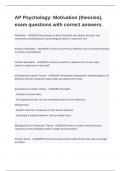
AP Psychology: Motivation (theories), exam questions with correct answers.
Motivation - ANSWER-the process by which activities are started, directed, and continued so that physical or psychological needs or wants are met Extrinsic Motivation - ANSWER-A desire to perform a behavior due to promised rewards or threats of punishment Intrinsic Motivation - ANSWER-A desire to perform a behavior for its own sake- interest / enjoyment in task itself (Evolutionary) Instinct Theory - ANSWER-Genetically predisposed: inherited patterns of behavior that are unlearned; baby...
- Exam (elaborations)
- • 4 pages •
Motivation - ANSWER-the process by which activities are started, directed, and continued so that physical or psychological needs or wants are met Extrinsic Motivation - ANSWER-A desire to perform a behavior due to promised rewards or threats of punishment Intrinsic Motivation - ANSWER-A desire to perform a behavior for its own sake- interest / enjoyment in task itself (Evolutionary) Instinct Theory - ANSWER-Genetically predisposed: inherited patterns of behavior that are unlearned; baby...
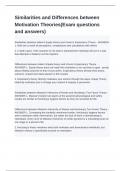
Similarities and Differences between Motivation Theories(Exam questions and answers)
Similarities between Adam's Equity theory and Vroom's Expectancy Theory - ANSWER-1. Both are a result of perceptions, comparisons and calculations with others 2. In both cases, if the outcome is not what is expected,the individual will act in a way that attempts to balance out the injustice Differences between Adam's Equity theory and Vroom's Expectancy Theory - ANSWER-1. Equity theory does not really link motivation to an outcome or goal - purely about relating outcome to that o...
- Exam (elaborations)
- • 2 pages •
Similarities between Adam's Equity theory and Vroom's Expectancy Theory - ANSWER-1. Both are a result of perceptions, comparisons and calculations with others 2. In both cases, if the outcome is not what is expected,the individual will act in a way that attempts to balance out the injustice Differences between Adam's Equity theory and Vroom's Expectancy Theory - ANSWER-1. Equity theory does not really link motivation to an outcome or goal - purely about relating outcome to that o...

Chapter 11 Motivation Theories and Applications, Complete and accurate exam solutions
Which of the following best characterizes the last 80 years of Taylorism? - ANSWER-It has become obsolete as a theory but parts of it are still relevant A Theory Y manager would NOT assume that the average person: - ANSWER-Is self-centered Equity theory implies that: - ANSWER-Employees are able to adjust for purchasing power and local market conditions Elton Mayo's biggest discovery was that work performance is also dependent on: - ANSWER-Social issues Which of the following is no...
- Exam (elaborations)
- • 2 pages •
Which of the following best characterizes the last 80 years of Taylorism? - ANSWER-It has become obsolete as a theory but parts of it are still relevant A Theory Y manager would NOT assume that the average person: - ANSWER-Is self-centered Equity theory implies that: - ANSWER-Employees are able to adjust for purchasing power and local market conditions Elton Mayo's biggest discovery was that work performance is also dependent on: - ANSWER-Social issues Which of the following is no...
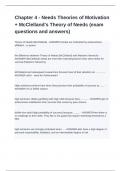
Chapter 4 - Needs Theories of Motivation + McClelland's Theory of Needs (exam questions and answers)
Theory of Needs (McClelland) - ANSWER-People are motivated by achievement, affiliation , or power the difference between Theory of Needs (McClelland) and Maslow's hierarchy - ANSWER-(McClelland) needs are more like motivating factors than strict needs for survival (Maslow's hierarchy) McClelland and subsequent researchers focused most of their attention on ............ - ANSWER-nAch - need for Achievement High achievers perform best when they perceive their probability of success ...
- Exam (elaborations)
- • 3 pages •
Theory of Needs (McClelland) - ANSWER-People are motivated by achievement, affiliation , or power the difference between Theory of Needs (McClelland) and Maslow's hierarchy - ANSWER-(McClelland) needs are more like motivating factors than strict needs for survival (Maslow's hierarchy) McClelland and subsequent researchers focused most of their attention on ............ - ANSWER-nAch - need for Achievement High achievers perform best when they perceive their probability of success ...
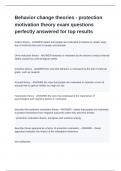
Behavior change theories - protection motivation theory exam questions perfectly answered for top results
Instinct theory - ANSWER-states that people are motivated to behave in certain ways due to instincts that exist in people and animals Drive-reduction theory - ANSWER-behavior is motivated by the desire to reduce internal states caused by unmt biological needs Incentive theory - ANSWER-the view that behavior is motivated by the pull of external goals, such as rewards Arousal theory - ANSWER-the view that people are motivated to maintain a level of arousal that is optimal neither too high...
- Exam (elaborations)
- • 3 pages •
Instinct theory - ANSWER-states that people are motivated to behave in certain ways due to instincts that exist in people and animals Drive-reduction theory - ANSWER-behavior is motivated by the desire to reduce internal states caused by unmt biological needs Incentive theory - ANSWER-the view that behavior is motivated by the pull of external goals, such as rewards Arousal theory - ANSWER-the view that people are motivated to maintain a level of arousal that is optimal neither too high...
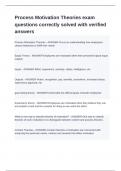
Process Motivation Theories exam questions correctly solved with verified answers
Process Motivation Theories - ANSWER-Focus on understanding how employees choose behaviors to fulfill their needs Equity Theory - ANSWER-Employees are motivated when their perceived inputs equal outputs Inputs - ANSWER-Effort, experience, seniority, status, intelligence, etc. Outputs - ANSWER-Praise, recognition, pay, benefits, promotions, increased status, supervisors approval, etc. goal-setting theory - ANSWER-Achievable but difficult goals motivate employees Expectancy theory -...
- Exam (elaborations)
- • 13 pages •
Process Motivation Theories - ANSWER-Focus on understanding how employees choose behaviors to fulfill their needs Equity Theory - ANSWER-Employees are motivated when their perceived inputs equal outputs Inputs - ANSWER-Effort, experience, seniority, status, intelligence, etc. Outputs - ANSWER-Praise, recognition, pay, benefits, promotions, increased status, supervisors approval, etc. goal-setting theory - ANSWER-Achievable but difficult goals motivate employees Expectancy theory -...
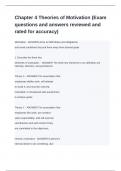
Chapter 4 Theories of Motivation (Exam questions and answers reviewed and rated for accuracy)
Motivation - ANSWER-strive to fulfill duties and obligations and avoid conditions that pull them away from desired goals 1. Describe the three key elements of motivation. - ANSWER-The three key elements in our definition are intensity, direction, and persistence. Theory X - ANSWER-The assumption that employees dislike work, will attempt to avoid it, and must be coerced, controlled, or threatened with punishment to achieve goals. Theory Y - ANSWER-The assumption that employees lik...
- Exam (elaborations)
- • 15 pages •
Motivation - ANSWER-strive to fulfill duties and obligations and avoid conditions that pull them away from desired goals 1. Describe the three key elements of motivation. - ANSWER-The three key elements in our definition are intensity, direction, and persistence. Theory X - ANSWER-The assumption that employees dislike work, will attempt to avoid it, and must be coerced, controlled, or threatened with punishment to achieve goals. Theory Y - ANSWER-The assumption that employees lik...
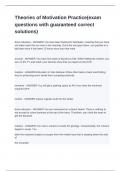
Theories of Motivation Practice(exam questions with guaranteed correct solutions)
drive reduction - ANSWER-You have been fasting for Ramadan, meaning that you have not eaten seen the sun rose in the morning. Once the sun goes down, you partake in a big feast since it has been 12 hours since your last meal arousal - ANSWER-You have five loads of laundry to fold. While folding the clothes, you turn on the TV and watch your favorite show that you taped on the DVR maslow - ANSWER-Education in Sub-Saharan Africa often takes a back seat finding food or protecting one's fam...
- Exam (elaborations)
- • 2 pages •
drive reduction - ANSWER-You have been fasting for Ramadan, meaning that you have not eaten seen the sun rose in the morning. Once the sun goes down, you partake in a big feast since it has been 12 hours since your last meal arousal - ANSWER-You have five loads of laundry to fold. While folding the clothes, you turn on the TV and watch your favorite show that you taped on the DVR maslow - ANSWER-Education in Sub-Saharan Africa often takes a back seat finding food or protecting one's fam...
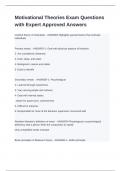
Motivational Theories Exam Questions with Expert Approved Answers
Content theory of motivation - ANSWER-Highlights special factors that motivate individuals Primary needs: - ANSWER-1- Deal with physical aspects of behavior. 2- Are considered unlearned 3- food, sleep, and water 4- Biological in nature and stable 5- Easy to identify Secondary needs: - ANSWER-1- Psychological 2- Learned through experience 3- Vary among people and cultures 4- Deal with internal states: -desire for power,love, achievement 5- Difficult to interpret. 6- Responsible f...
- Exam (elaborations)
- • 6 pages •
Content theory of motivation - ANSWER-Highlights special factors that motivate individuals Primary needs: - ANSWER-1- Deal with physical aspects of behavior. 2- Are considered unlearned 3- food, sleep, and water 4- Biological in nature and stable 5- Easy to identify Secondary needs: - ANSWER-1- Psychological 2- Learned through experience 3- Vary among people and cultures 4- Deal with internal states: -desire for power,love, achievement 5- Difficult to interpret. 6- Responsible f...
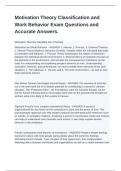
Motivation Theory Classification and Work Behavior Exam Questions and Accurate Answers.
Motivation Theories Classified into 3 theories Motivation and Work Behavior - ANSWER-1. Internal, 2. Process, 3. External Theories. 1. Internal Theory Maslow's hierarchy of needs. Variable within the individual that leads to motivation and behavior. 2. Process Theory Emphasizes the nature of interaction between the individual and the environment. 3. External theory of motivation focuses on the elements in the environment, and includes the consequences of behavior as the basis for understandi...
- Exam (elaborations)
- • 7 pages •
Motivation Theories Classified into 3 theories Motivation and Work Behavior - ANSWER-1. Internal, 2. Process, 3. External Theories. 1. Internal Theory Maslow's hierarchy of needs. Variable within the individual that leads to motivation and behavior. 2. Process Theory Emphasizes the nature of interaction between the individual and the environment. 3. External theory of motivation focuses on the elements in the environment, and includes the consequences of behavior as the basis for understandi...
